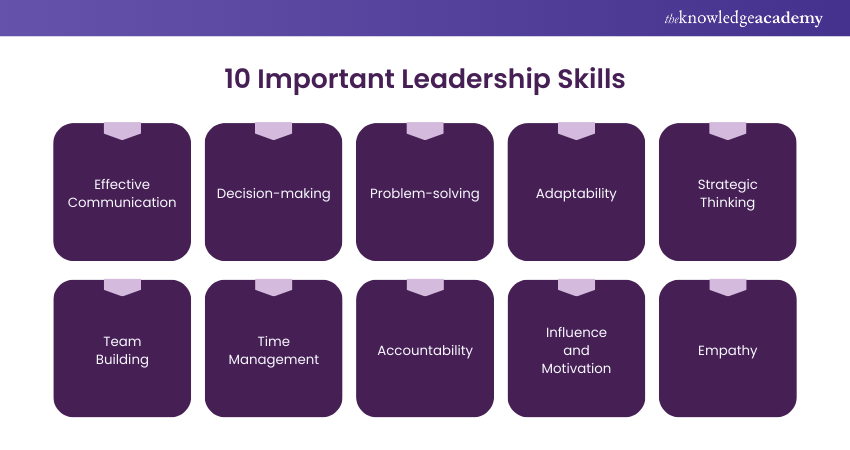We may not have the course you’re looking for. If you enquire or give us a call on +43 720 115337 and speak to our training experts, we may still be able to help with your training requirements.
We ensure quality, budget-alignment, and timely delivery by our expert instructors.

Wondering what makes a good leader? Understanding Leadership Skills is important for aspiring leaders and managers. But how do you develop these skills to excel in leadership roles? Effective leadership demands specific skills, yet the diverse traits and styles of different leaders can make identifying these essentials challenging.
Leadership quality greatly impacts organisational success and growth. Without honing these skills, aspiring leaders may struggle to navigate challenges and inspire teams effectively. Explore this blog to learn everything about Leadership Skills development. This includes the essential traits, strategies, and techniques essential for aspiring leaders. Let's dive into the world of effective leadership!
Table of Contents
1) What are Leadership Skills?
2) 10 Important Leadership Skills
3) Who Needs Leadership Skills?
4) How to Improve the Skills of a Leader?
5) Five Major Ways to Develop Leadership Skills
6) Conclusion
What are Leadership Skills?
Leadership Skills encompass a diverse set of abilities that empower individuals to lead and manage others effectively. These skills include personal attributes, effective communication techniques, and strategic thinking. Leadership Skills are not confined to specific roles or industries but are valuable in a wide range of contexts, including business, education, sports, and community organisations.
Leaders who possess these skills can inspire and motivate their teams, fostering a collaborative and productive environment. Personal qualities such as integrity, empathy, and resilience form the foundation of effective leadership, enabling Leaders to build trust and respect among their followers.

10 Important Leadership Skills
Now that you know "What are Leadership Skills?" and their importance, let’s learn each one of them in detail. Here's a list of Leadership Skills that enhance an individual’s effectiveness as a Leader:

1) Effective Communication
Clear and effective communication is important to effective Leadership. Leaders must be able to articulate their ideas and thoughts clearly, both verbally and in writing. This ensures that their messages are understood by their team members. Active listening is also important, as it allows Leaders to understand others' concerns and perspectives. This creates trust and collaboration within the team.
2) Decision-making
Decision-making is one of the most essential Leadership Skills that a Leader needs to have. Leaders are required to make important decisions in their teams and organisations. Some of the Decision-making Skills involve the following:
a) Gathering relevant information
b) Analysing the pros and cons
c) Considering the long-term consequences
Leaders must make decisions on time. They should look at issues from the Employees’ perspective and the objectives of the organisation.
Sign up for our Leadership Skills Training and elevate your Leadership Skills now!
3) Problem-solving
Leaders face various difficulties and issues in their positions. Proficient problem-solving skills empower them to tackle challenges by doing the following:
a) Recognise and characterise issues
b) Investigate potential resolutions
c) Execute efficacious tactics
Leaders can stimulate innovation and ongoing development in their teams by rewarding creative thinking and cultivating a problem-solving mentality.
4) Adaptability
Leaders must be adaptable and flexible. They should embrace new ideas and technologies, navigate uncertain situations, and lead their teams through change. Being open to new perspectives and willing to adjust strategies when necessary allows Leaders to navigate challenges and seize opportunities effectively.
5) Strategic Thinking
Strategic thinking simply means that one is able to plan for the future of any organisation by devising and implementing strategies. The persons with impressive strategic thinking capabilities can foretell the tendencies on the market, the chances for development, and the possible risks.
From the organisational strategic plan, they ensure that their activities conform, and they motivate their subordinates to achieve the vision of the organisation.
6) Team Building
Leaders must be skilled in building and nurturing high-performing teams. They should understand the strengths and weaknesses of team members and assign tasks effectively. They must also create an environment that fosters collaboration, trust, and mutual respect.
By promoting a sense of belonging and encouraging diversity of thought, Leaders harness the collective potential of their teams and drive them towards success.
7) Time Management
Effective Leaders have the ability to evaluate what must be done, when that has to be done, and see that it is done on time. They understand that there are always going to be certain expectations set forth for one to achieve. They also have to be able to assign duties where needed and distribute organisational resources adequately.
Through setting good time management practices Leaders encourage the workers and the personnel to work hard in order to complete their set goals and targets.
8) Accountability
Leaders hold themselves responsible for their actions, decisions, and team outcomes. They take accountability for both successes and failures, admitting mistakes and learning from them. By demonstrating a strong sense of accountability, Leaders develop a culture of ownership and responsibility within their teams. This fosters a high-performance environment.
9) Influence and Motivation
Leaders have the power to influence and motivate others to reach their full potential. They build trust and respect through their actions and words, empowering team members to take initiative and deliver their best work.
Effective Leaders understand what drives each individual and tailor their approach to inspire and engage everyone uniquely.
10) Empathy
Empathy is the proficiency to understand and share the emotions and perspectives of others. Leaders with strong empathy connect deeply with their team members, showing genuine care and understanding. By actively listening and demonstrating empathy, Leaders foster strong relationships, create a supportive work environment, and promote collaboration and teamwork.
Boost your team performance and productivity with our Successful People Management and Team Leadership Course – Sign up now!
Who Needs Leadership Skills?
Leadership Skills are necessary for a wide range of individuals, not just those in traditional Leadership positions like Managers and Executives. They are vital for professionals at all levels, including Team Leaders, Project Managers, Entrepreneurs, Educators, and even individual contributors.
Leadership Skills help in guiding teams, inspiring and motivating others, making strategic decisions, and driving projects to success. They are also important for personal development, enabling individuals to take initiative, manage their own goals effectively, and influence others positively.
Thus, anyone who aims to influence, manage, or lead others, whether in a formal or informal capacity, needs Leadership Skills.
Become familiar with using creativity in Leadership with our Creative Leader Training Register today!
How to Improve the Skills of a Leader?
Becoming an effective Leader requires a blend of Leadership Skills and honing key workplace abilities. Here’s a detailed approach to enhancing your Leadership Skills:
1) Create a Clear Plan: Begin by setting specific goals and outlining a structured plan to achieve them. This roadmap provides clarity and direction, guiding both your personal growth and your team’s success.
2) Show Passion and Commitment: Demonstrate genuine enthusiasm for your work and vision. Passion is contagious and inspires others to align their efforts with common goals, fostering a motivated and engaged team.
3) Lead by Example: Exemplify the qualities and behaviours you expect from your team. Your actions speak louder than words, establishing trust and respect while setting a standard for professionalism and dedication.
4) Leverage Your Strengths: Recognise your strengths and capitalise on them to benefit your team’s performance. Utilising your unique abilities enhances productivity and morale, driving collective success.
5) Set and Execute Concrete Goals: Break down overarching goals into manageable, actionable steps. Consistently follow through on these objectives, ensuring progress and momentum towards achieving broader organisational targets.
6) Embrace Failure as a Learning Opportunity: Acknowledge mistakes openly and use them as opportunities for growth. Cultivate a culture that values resilience and learning from setbacks, fostering innovation and continuous improvement.
7) Inspire and Empower Others: Motivate your team by empowering them to take ownership of their roles and responsibilities. Encourage autonomy, provide guidance, and celebrate achievements to foster a supportive and high-performing environment.
8) Align with a Higher Purpose: Understand the greater purpose behind your work and Leadership role. Connecting individual and team efforts to broader organisational goals instils meaning and inspires dedication among team members.
Conclusion
Good Leadership Skills are essential for aspiring Leaders and Managers aiming to climb the ladder of success. By developing a diverse skill set and continuously refining it, individuals can become effective Leaders and achieve remarkable results. We hope this blog has helped you understand "What are Leadership Skills?" and their importance in successfully leading your team.
Enhance your Leadership Skills through interactive activities and real-world scenarios with our Leadership Courses – Join now!
Frequently Asked Questions
Can Individuals Access Reliable Resources or Training to Develop and Strengthen Their Leadership Skills?

Yes, individuals can access various reliable resources and training programs to develop and strengthen their Leadership Skills. Online courses, workshops, Leadership books, mentorship programs, and professional organisations offer valuable insights, practical strategies, and opportunities for continuous learning and growth.
In What Ways can Individuals Develop and Enhance Their Leadership Skills, Fostering Growth and Proficiency in Leadership Roles?

Individuals can develop and enhance Leadership Skills by setting clear goals, seeking feedback, and continuously learning through courses and workshops. Practising self-awareness, effective communication, and empathy, as well as gaining experience through Leadership roles, volunteering, and mentorship, fosters growth and proficiency in Leadership roles.
What are the Other Resources and Offers Provided by The Knowledge Academy?

The Knowledge Academy takes global learning to new heights, offering over 3,000 online courses across 490+ locations in 190+ countries. This expansive reach ensures accessibility and convenience for learners worldwide.
Alongside our diverse Online Course Catalogue, encompassing 19 major categories, we go the extra mile by providing a plethora of free educational Online Resources like News updates, Blogs, videos, webinars, and interview questions. Tailoring learning experiences further, professionals can maximise value with customisable Course Bundles of TKA.
What is a Knowledge Pass, and How Does it Work?

The Knowledge Academy’s Knowledge Pass, a prepaid voucher, adds another layer of flexibility, allowing course bookings over a 12-month period. Join us on a journey where education knows no bounds.
What are Related Leadership Courses and Blogs Provided by The Knowledge Academy?

The Knowledge Academy offers various Leadership Courses, including Leadership Skills, Introduction to Supervising a Team, and Successful People Management and Team Leadership Courses. These courses cater to different skill levels, providing comprehensive insights into Various Leadership Styles.
Our Business Skills Blogs covers a range of topics related to Leadership, offering valuable resources, best practices, and industry insights. Whether you are a beginner or looking to advance your Leadership skills, The Knowledge Academy's diverse courses and informative blogs have you covered.
Upcoming Business Skills Resources Batches & Dates
Date
 Successful People Management and Team Leadership
Successful People Management and Team Leadership
Fri 16th May 2025
Fri 25th Jul 2025
Fri 29th Aug 2025
Fri 10th Oct 2025
Fri 28th Nov 2025






 Top Rated Course
Top Rated Course


 If you wish to make any changes to your course, please
If you wish to make any changes to your course, please


